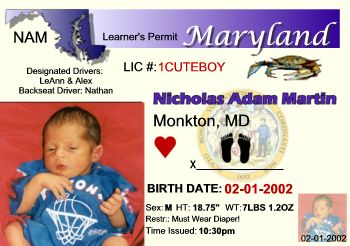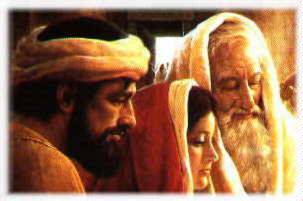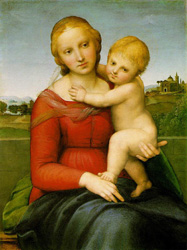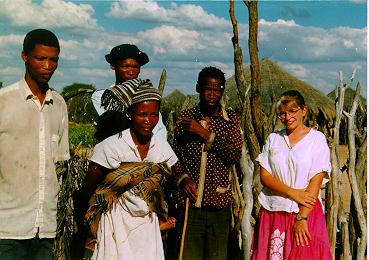
(Matthew 16:13-23)
May these words of this Peter be like a rock,
not a stumbling block!
|
|
"Who do you say
that I am?" Jesus asked. Simon Peter answered, "You
are the Messiah, the Son of the living God." And Jesus
answered, "Blessed are you, Simon son of Jonah! ... You are
Peter (petros), and on this rock (petra)
I will build my church..." Jesus then began to speak of
the rough road ahead. And Peter took him aside and rebuked him... "Get
behind me, Satan!" Jesus replied. "You are a stumbling
block..." (Matthew 16:13-23) May these words of this Peter be like a rock, |
"In the hands of a teenager"
Message preached December 18,
2011
Long Green Valley Church of the Brethren
Glen Arm, Maryland USA
based upon
Luke
1:26-38, 46-55
When it comes to
teaching a young person how to drive, Iíve had experience. My fourth (and
youngest) is now doing her part, and doing it very well, thank you. I still,
however, am a little nervous when I move over into the passenger seat. Many
moons ago, my oldest only needed 40 hours of supervised driving before being
able to take the test for a provisional permit. Now itís up to 6 0
hours, for which Iím thankful. I well remember each of my children starting out
on the church parking lot wondering if they could ever keep the vehicle pointed
straight. With auto accidents the leading cause of death among youth, itís a
fearful prospect for parents to allow their children behind the wheel. Itís not
easy to place this dangerous machine into the hands of a teenager...
0
hours, for which Iím thankful. I well remember each of my children starting out
on the church parking lot wondering if they could ever keep the vehicle pointed
straight. With auto accidents the leading cause of death among youth, itís a
fearful prospect for parents to allow their children behind the wheel. Itís not
easy to place this dangerous machine into the hands of a teenager...
Think about the story of salvation as we have received it. This new portion of it which guides our way as those who believe in and commit our very lives to Christ, it begins with a teenager. Oh, I know, thereís much more to it than that. And it depends upon which gospel to which you listen as to where it all starts. John goes back to the beginning of all things and, along with Mark, skips over any mention of Jesusí birth, or his youth. Itís from Matthew and Lukeís accounts that we derive the story of Christmas, and even there we find differences. Matthew seems more concerned with the father, or should I say the "step-father," Joseph, who adopted Jesus as his own earthly son. Luke, on the other hand, focuses on a teenager named Mary.
Thatís right, I said a "teenager." Thatís what she was. Luke calls her a virgin, linking back to the words of Isaiah. Huge battles have been fought in the church over this word, especially in the modern era. On the one hand are those who wonder if God really impregnated Mary supernaturally, or if this wasnít just later believers inserting this particular detail into scripture to make a theological point. On the other hand are those who believe firmly in Maryís virginity, some believing she was chaste to the end of her days, and they see doubt as heresy.
Me? Well,
I wonder if this argument hasnít missed the real point altogether. Call me
naive, but I believe that God is God, and if God chooses to act in ways that
follow the natural course of things, God will do so. And if God chooses to
follow
 a
different course, beyond what we currently understand, then who am I to argue?
Even so, focusing on the "sex" of it all seems a bit absurd to me.
Now, I know we are sexual beings. Sex is an important part of our
make-up, something we shouldnít pretend doesnít exist. Still, sex is
not really what is central here.
a
different course, beyond what we currently understand, then who am I to argue?
Even so, focusing on the "sex" of it all seems a bit absurd to me.
Now, I know we are sexual beings. Sex is an important part of our
make-up, something we shouldnít pretend doesnít exist. Still, sex is
not really what is central here.
Mary is called a "virgin" by gospel storyteller Luke. When the angel Gabriel announces that she will conceive and bear a son, she herself says, "How can this be, since Iím a virgin?" or literally, "since I have not known a man?" (1:35). The word "known" here is the way the Bible often speaks of intercourse, thus placing it in a larger framework than a mere physical act. Mary wasnít ignorant. She knew enough about the way things happen to know that from point "A" you donít get to point "C" except through point "B." She was betrothed/engaged to Joseph, but they had not yet come to this point in their relationship.
When receiving this story, however, I believe we need to shift gears and approach this word "virgin" from a different angle. It doesnít just reveal her status relationally, or even sexually. It says something about her youth. Though mature beyond her years, Mary is at this point in the story a teenager. She has not faced some of the crucial tests of life. Can you catch the real wonder at this scene as we are allowed a peek in on it over Gabrielís shoulder? An automobile is nothing next to what God entrusted into the hands of this teenager.
Of course, God has a habit of doing that - of placing awesome responsibility into the hands of those who are still wet behind the ears. God must know what heís doing, but sometimes you wonder. I mean, itís a dangerous world out there. Always has been. Especially for women who, over the course of history, have often found themselves at the bottom of world events, their stories rarely recorded, even though they are uniquely responsible for one generation following another. Our foundational story, my brothers and sisters in Christ, depends upon a teenager, upon an inexperienced and untried young woman. The greatest story ever told begins with the greatest risk ever undertaken.
We need to
really tell the story as we have received it. The possibilities for everything
to go wrong were there along every step of the way. Suppose this girl-of-a-woman
said "no" when Gabriel visited her. Was "no" even a
possibility? Can you
 say
"no" to God? I know plenty of people who do. "Sorry, Gabriel, but
this doesnít fit into my plans. Joseph and I have this big wedding planned,
even booked the Nazareth dance hall for the party afterward, and everyone knows
how hard it is to get on that list. Furthermore, Iím not ready for a child.
Give us a while to get to know each other before we have to deal with a little
one underfoot. Would you tell the Lord that Iím very flattered that heís Ďwith
me (?),í but now is not a good time..."
say
"no" to God? I know plenty of people who do. "Sorry, Gabriel, but
this doesnít fit into my plans. Joseph and I have this big wedding planned,
even booked the Nazareth dance hall for the party afterward, and everyone knows
how hard it is to get on that list. Furthermore, Iím not ready for a child.
Give us a while to get to know each other before we have to deal with a little
one underfoot. Would you tell the Lord that Iím very flattered that heís Ďwith
me (?),í but now is not a good time..."
Yes, I know that such a response interjects present-day realities upon an ancient culture. Marriage back then was very different, and couples were more dependent upon arrangements made by others - their families, their community. "Choice" is a relatively new concept in many ways. If we were to make this story a better fit for today, Mary would be facing a decision on what career she would pursue, perhaps what college she would attend, and other details involving the launching herself from her parentís nest. Gabrielís visit would be even more of an intrusion... Is there an opening in our agenda today for a calling from God?
Back to Mary in the story we have received, what if she had said "no" to God? I suppose God would have tapped someone else to bear this good news. Then, again, the Lord is a good judge of character. He mustíve known that Mary would respond, "Here I am, young as I am. Iíll serve the Lord. Let it be as youíve said." Of course, that was only the beginning of the risk God undertook. What about Josephís reaction? Mary couldíve have been killed for even the appearance of infidelity in that culture. What did God give her to back up her stance? ... "Oh, I was visited by an angel. Thatís why Iím pregnant." ... Without Josephís involvement, sheíd soon be under a pile of stones.
I spoke last week of the risk of their journey to Bethlehem. This was no honeymoon, folks, no matter how many pretty lights we place around it. Do you think they wanted to head there? It was because of Josephís family that they had to go (Luke 2:4). The whole bit about the motels in town being full should say to us that this couple was lost in the larger picture of that day. Who were they that anyone around them should care? Whatever travel agent had been in charge of booking that trip shouldíve been fired. Oh, yeah, that wouldíve been God. Well, at least they had a donkey...
The rest
of the story as we have received it reveals that this was no cake walk. As you
prepare to celebrate Christmas
 this
year, sit down and ponder anew your nativity set, if you have one. Mary was not
made of plastic, porcelain, or wood. She was a young woman, as real as my own
daughter - perhaps even much younger. They married early back then, some even
pre-teen. Can you imagine? It scares me at times to think of an automobile in
the hands of my teenager. But what about this? When Gabriel said, "Donít
be afraid," was he talking to Mary or to us?
this
year, sit down and ponder anew your nativity set, if you have one. Mary was not
made of plastic, porcelain, or wood. She was a young woman, as real as my own
daughter - perhaps even much younger. They married early back then, some even
pre-teen. Can you imagine? It scares me at times to think of an automobile in
the hands of my teenager. But what about this? When Gabriel said, "Donít
be afraid," was he talking to Mary or to us?
You see, what I really want to get at on this Sunday before Christmas is how God is still in the habit of entrusting awesome things into the hands of those who are inexperienced and untried. This celebration is not just a feel-good holiday that gives us time off from the stuff that supposedly matters more - you know: work or school. This holy day is about "calling." The message that, in Christ, God is "incarnate" in our everyday life - that the Creator of the Universe is involved in every aspect of our existence, that God is "with us" in flesh and blood ways - this is a message in search of messengers.
Of course, the Christmas saga is only part of a larger story, a message that involves the risk of a cross and the joy of an empty tomb. This message needs people willing to be its messengers. That doesnít mean just talk, though often we forget to speak what we know to be the truth. In failing to share the message, we deprive others of hearing what they need to hear. Beyond speaking the good news of Christ, however, God calls us to be (like Mary?) "bearers" of this good news, to embody it in our lives - to let it grow in us and bring it to birth. Thatís not an easy job. As far as I know, a mother-to-be doesnít stop being pregnant once her 8-hour shift is over. Itís 24/7 until labor day, and even then the task has only just begun.
God calls
us to bear the good news, to embody it, to - if you will - let Christ be born in
us. To be honest, thatís not really something that can be hidden. Nor should
it be. At times, Iíll grant you, itís very uncomfortable. Being a Christian,
which is what I mean by all this, is not an easy task. We may not feel
qualified, or experienced. And yet, look at what God entrusts into the hands of
those who, by the way the world measures things, might seem to be a risky
investment. Consider Mary. Please donít put this woman up on some pedestal.
Unfortunately, thatís what the Catholics have done with her. But by the same
token, donít toss her off as too many Protestants have. Sheís an example of
someone who simply said "yes" to God.
Of course, when you say "yes" to God, watch out. Who knows where that calling might take you. Some of you, even those of you anticipating or already possessing a driverís license, may be hearing God call you to some particular task. You donít have to get a visit from Gabriel to be called by God, you know. Could it be that you hear a nagging voice in the back of your head, saying, "the Lord is with you," and you tremble at the prospect of where this voice might lead? If you havenít yet, it could be you will.
Now, if you respond - "Iím too young, too inexperienced, too untested," or even, "Thatís not really the direction I see my life as leading," remember Mary, and what God entrusted into the hands of a teenager.
By the way, do you know who (according to Luke) was the first preacher in the New Testament? It was none other than Mary. Why donít we let her have the last word this morning? Please turn to the back of your hymnal to #715 and letís read responsively what she had to say (Luke 1:46-55). Since these words come from the lips of a young woman, Iíve asked _________ to lead us. Shall we stand?
| online resources for these texts Luke 1:26-38 and 1:39-56 |
For commentaries consulted, see Luke. |
©2011, revised from 2002 Peter L. Haynes